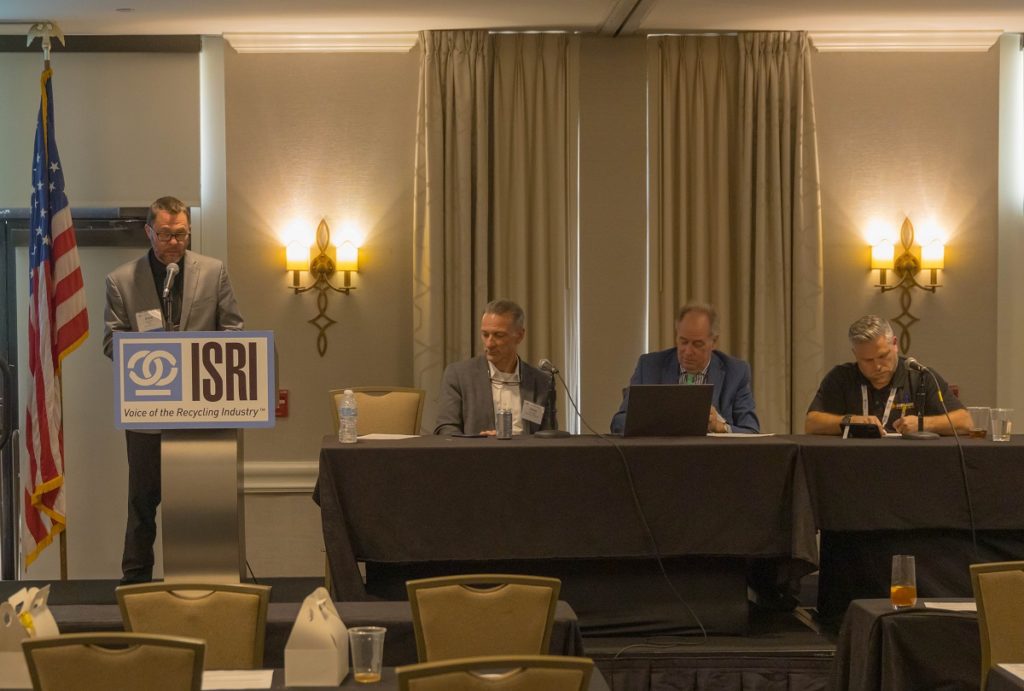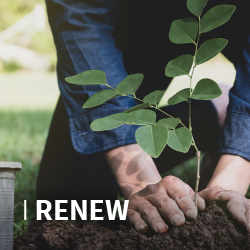The 2021 ISRI Fall Meetings began Monday, Oct. 18, in Charleston, S.C. The meetings run through Wednesday, Oct. 20. Most of the meetings are open and free for all ISRI members to attend. A handful of virtual meetings were held the week of Oct. 10-16, including the Equipment and Service Providers Committee, the Shredder Committee, State Subcommittee, and ISRI’s Young Executives Council.
The opening Board of Directors meeting began with ISRI Chair Gary Champlin welcoming all in-person and virtual attendees to the 2021 ISRI Fall Meetings. Attendees were reminded about the upcoming ISRI Southeast Region Fall Conference and Trade Show, which runs from Oct. 19-23 in Charleston, S.C.
Cheryl Coleman, ISRI’s vice president of sustainability, reported on ISRI’s efforts to widen the workforce pipeline for the recycling industry, as well as its growing sustainability efforts. ISRI has formed a sustainability network that consists of ISRI members looking to launch sustainability efforts and those with well-developed programs. ISRI will have a Sustainability track at ISRI2022 where members will learn the basics of sustainability and easy to do environmental, social, and governance (ESG) risks and opportunity assessments; how to measure progress and the importance of recycling to manufacturing and the circular economy.
The association plans to launch the ISRI Talent Educate, Employ, Empower (E3) Acquisition and Retention Program pilot program in June 2022. ISRI will work with members and Historically Black Colleges and Universities (HBCUs)/Tribal Colleges and Universities (TCUs), trade schools, community colleges and their students. ISRI is also working collaboratively with the Federal Department of Labor and Keep America Beautiful (KAB) and their affiliate network in the metro-Atlanta area. ISRI will work with partners to design curricula and training programs to prepare students academically and host a series of seminars as part of the program to support the experiential learning opportunities.
During the Safe Operations Committee, Tony Smith, ISRI’s vice president of safety, reminded members that the Occupational Safety and Health Administration (OSHA) is developing an Emergency Temporary Standard that will require employers with 100 or more workers to ensure workers are either vaccinated or tested for COVID-19 weekly before coming to work. Ryan Nolte, Ph.D., ISRI’s director of safety outreach, announced the dates for the virtual fall ISRI Safety and Environmental Conference. ISEC will be at 2 p.m. on consecutive Tuesdays, Nov. 9, 16, and 23.
Fire Task Force Co-chair Jeff Farano commented on Los Angeles County’s proposal to require metal recycling facilities to be enclosed, increasing the hazards to first responders in case of fire. California’s Department of Toxic Substance Control recently launched an emergency rulemaking amending California’s definition of metal from shredders. Litigation seeking to overturn the rulemaking is likely.
Smith introduced Jerry Sjogren, ISRI’s new senior safety director. David Wagger, Ph.D., ISRI chief scientist and director of environmental management, provided an update on two issues ISRI is following: the Center for Biological Diversity’s challenge to the Environmental Protection Agency’s 2021 Multi-Sector General Permit, and the EPA’s proposed new testing method for the group of chemicals known as PFAS.
The Electronics Division opened with an update from ISRI staff on the Biden administration’s vaccine mandate regarding federal contracts. ISRI members with federal contracts or who are interested in applying for federal contracts should be aware that employers are required to ensure their employees are fully vaccinated by Dec. 8. ISRI will continue to monitor this issue and provide information to members.

The division discussed ISRI’s participation in the ITAD summit in August, noting that ITAD is the fastest growing sector of the recycling industry. The next major event for the division will be the Technology Recycling Conference “Critical Elements for Recycling in a Circular Economy,” a joint event between ITI and ISRI on the circular economy and how electronics are becoming more sustainable. There was also an update on R2V3 and a discussion on international trade issues concerning the division. The discussion concluded with a review of the sessions the division plans to hold during ISRI2022 in March.
During the Tire and Rubber Division meeting, Joe Pickard, ISRI’s chief economist and director of commodities, provided an update on the Scrap Tire Value Chain/Coalition, of which ISRI is a part of. Led by the US Tire Manufacturers Association (USTMA), the coalition’s goal is to coordinate advocacy work on behalf of individual companies and associations. The coalition discussed a variety of topics during its meeting in September and will have another meeting in late October. Pickard notes that USTMA is looking to host a market segment webinar, which would be valuable to division members. He also notes that the USTMA would be open to topics that the division would like to see addressed, such as Pyrolysis and TDA.
There was also a plug for the NCSL Summit in November made during the meeting. Over the last several years, the Tire and Rubber Division has been active at the event, and that will be no different this year. There will be a tire and rubber display at ISRI’s booth at the summit, and a tour will be provided to NCSL legislators and attendees, where they can ask questions about different commodities, including tire and rubber.

The Women in Recycling (WIR) council began with a review of its new mission statement followed by updates from the co-chairs. There was a review of WIR’s events including two recent webinars; Afternoon Exercise: Train Your Mind Muscle, in August, and Unlock Your Hidden Potential, in October. The council highlighted its new mentorship program which launched in April 2021 and has 20 participants. Mentors and mentees both in-person and via Zoom had the opportunity to share some of the benefits and opportunities of the program with the rest of the council. The WIR communications subcommittee and online programming subcommittee provided updates. Attendees were notified of WIR’s upcoming in-person event at the Charleston Marriot on Wednesday, Oct. 20, which is part of the Southeast Region Fall Conference and Trade Show. Participants will be decorating and then packing Thanksgiving meals in partnership with a local nonprofit called East Cooper Community Outreach (ECCO).
Ben Abrams, president of Consolidated Scrap Resource, supplied insights on Surface Transportation Board concerns during the Ferrous Committee meeting. These include the STB’s denial of the proposed merger of the Canadian National Railway and Kansas City Southern Railway; end of the comment period for issues of first-mile/last-mile (FMLM) service; and railroad revenues. Several members in attendance noted the ongoing problems their businesses have with inconsistent rail service.
Billy Johnson, ISRI’s chief lobbyist, covered recent regulatory moves related to transportation. Adina Renee Adler, ISRI vice president of advocacy, related that the Office of the U.S. Trade Representative said it would reopen the application process for U.S. companies to get out of paying tariffs on certain goods imported from China. This could open the way for importation of shredder wear parts. On behalf of the Auto Recycling Committee, Co-chair John Bianculli noted that 10 states recently passed anti-theft legislation to address the nationwide rash of catalytic converter thefts.
Dr. Wagger brought to members’ attention the launch of the second annual Bureau of International Recycling survey that seeks safety data from shredder operators. Pickard provided updates on the international and domestic steel marketplace, showing that despite a slow September, year-to-date production, importing and exporting of virgin and reclaimed steel is up.
The meetings continue through Wednesday, Oct. 20. You may view the full schedule here.
Photos courtesy of ISRI.
Additional Resources













